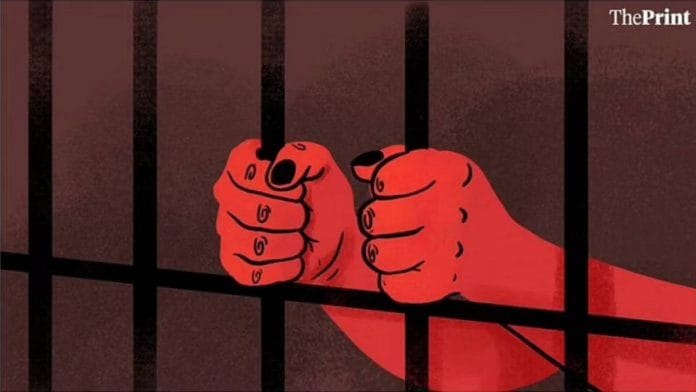New Delhi: In November 2003, Shubha Shankar, a 20-year-old student at Bengaluru’s BMS College of Law and the daughter of a prominent advocate, got engaged to a software professional, B.V. Girish, 26.
But within three days of the happy event, Girish was dead. He was attacked with a steel rod on his head by an unknown assailant while he was watching planes land at the city’s Airport Ring Road with his fiancée. The murder shook the city.
In January 2004, Shubha, her fellow college student Arun, their acquaintance Venkatesh and Shubha’s cousin Dinakaran were arrested for the murder of Girish and criminal conspiracy in the matter. The four were subsequently sentenced to life in jail.
More than two decades later, the Supreme Court Monday upheld the conviction of Shubha, Arun, with whom she was believed to be in a relationship that her family was disinclined towards, Venkatesh, who helped them carry out Girish’s murder, and Dinakaran.
The court, however, allowed the convicts to seek pardon by filing in eight weeks appropriate petitions before the Governor of Karnataka. It has stayed their arrest and suspended their sentence till then.
In its 134-page ruling, the court noted that the convicts had committed the offence “with adrenaline pumping” in their veins and had now reached middle age, and that two of the four accused were mere teenagers when the crime took place.
“Their conduct in the prison is also not adverse. They were not born as criminals, but it was an error of judgment through a dangerous adventure which led to the commission of a heinous crime. It is difficult for us to decide at this stage who influenced the other, although there is a clear meeting of minds,” the court ruled, upholding their conviction for murder and criminal conspiracy.
The two-judge bench of Justices M.M. Sundresh and Aravind Kumar added: “In light of the same, we would like to facilitate the appellants’ right to seek pardon by permitting them to file appropriate petitions before His Excellency the Hon’ble Governor of Karnataka. We would only request the constitutional authority to consider the same, which we hope and trust would be done by taking note of the relevant circumstances governing the case.”
The court has granted the appellants eight weeks to file their pleas, pursuant to Article 161 of the Constitution. “Till these petitions are duly considered and decided, the appellants shall not be arrested and their sentence shall remain suspended,” it said.
Also Read:
How do mercy petitions work?
Section 473(1) of Bharatiya Nagarik Suraksha Sanhita allows a convict “under the sentence of death” or their legal heir or any relative to file a mercy petition before the President of India under Article 72 or before the Governor of the State under Article 161.
This is to be done within 30 days after the date on which the jail superintendent informs the convict about the dismissal of appeal by the Supreme Court. Following this, the mercy petition may be presented to the Centre or the state’s home department, as the case may be.
While the mercy petition under subsection (i) may initially be made to the Governor, its rejection or disposal will result in it being forwarded to the President within 60 days.
In cases where there are multiple convicts, the jail superintendent or officer-in-charge shall ensure that every convict makes a mercy petition within 60 days. If the superintendent doesn’t receive the mercy petitions from all other convicts in the case, he shall himself “send the names, addresses, copy of the record of the case and all other details of the case to the Central Government or State Government for consideration along with the said mercy petition”.
In the present case, too, the court said that Article 161 has an in-built laudable objective. “This Article emphasises the role of the State to facilitate an offender to be reintegrated into society, after realising his mistake. This power is sovereign, and is to be exercised on the advice of the Council of Ministers. Thus, it grants the Constitutional Court only a limited power of judicial review.”
How case unfolded in court
In its 14 July ruling, the Supreme Court concluded that Shubha was unwilling to marry Girish, but agreed to it owing to her parents’ wishes—a fact she confided in her close friend Arun. This, the court believed, was the motive behind Girish’s murder.
The authorities analysed a string of digital evidence, including phone calls and SMS data, forensic evidence and eyewitness accounts, to conclude that there was a close relationship between Arun and Shubha, given that he frequently visited her house for “moot court rehearsals”.
“The voice of a young, ambitious girl, muffled by a forced family decision, created the fiercest of turmoil in her mind. This, backed by an unholy alliance of mental rebellion and wild romanticism, led to the tragic murder of an innocent young man, while simultaneously destroying the lives of three others,” the court noted in its decision.
After the arrest of Shubha, Arun, Venkatesh and Dinakaran in January 2004, a fast-track court first sentenced them to life in 2010, with an additional three-year sentence for Shubha, and a Rs 25,000 rupee for destroying evidence. Besides this, each of the accused was asked to pay a Rs 50,000 fine, while the court also directed compensation of Rs 2 lakh for Girish’s family.
The Karnataka High Court subsequently confirmed the fast-track court’s decision. Shubha was granted bail in August 2014, and challenged her conviction in the Supreme Court, which rejected the petition Monday. The other convicts were also granted bail in the case.
(Edited by Nida Fatima Siddiqui)
Also Read: Mangalsutra, shampoo for women & sweets on festivals — UP’s new jail manual makes basics ‘official’







Women can easily get away with murder in our society. The Supreme Court has set a wrong precedent for the Indian judiciary. As it is, the laws are inherently anti-men and pro-women.